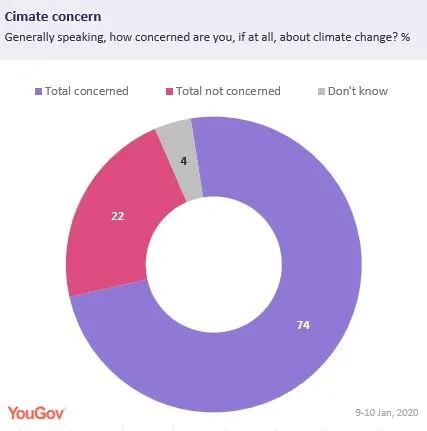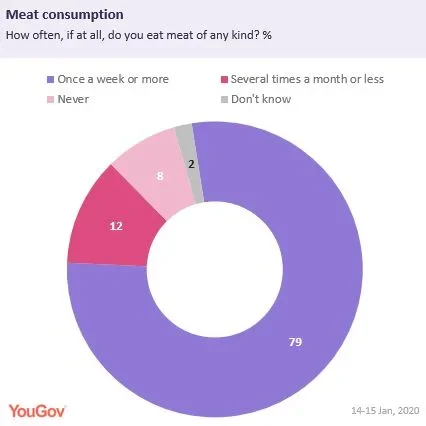This week, the Intellectual Forum at Jesus College, Cambridge, will hold a conference on Food, Farming and Climate Change, looking at how to meet the combined challenge of feeding a growing population while ensuring environmental sustainability. As its organisers suggest, this is no mean feat, given that population growth may require a 50-60% increase in global food production by 2050.
To support the event, Jesus College partnered with the YouGov-Cambridge Centre to conduct two nationally representative surveys of the British public, with the first focused on attitudes and the second on lifestyle and practical choices. The research forms part of the Centre’s new YouGov-Cambridge Climate Project, which aims to develop a long-term, public offering of global data on changing environmental attitudes and behaviours.
According to the first survey, it’s good news for environmentalists, as the public mood seems steadfastly behind them.
Some three quarters of respondents overall (74%) described themselves as concerned about climate change, including large majorities regardless of political or demographic characteristics. By a similar token, nearly a third (27%) listed the environment as one of the top three issues facing the country, notably more than those saying the same for immigration (21%), housing (14%) education (13%) and the economy (24%).

These results duly fit with consistently high YouGov figures over recent years, showing that global warming scepticism is all but dead among the British public, with a vast majority now believing in climate change, and the notion that human activity is varyingly responsible.
The second survey paints a different picture, however, when it comes to practical choices.
For one thing, Britain remains a stubborn nation of carnivores, with three quarters (71%), saying they consume meat several times a week or more, including nearly a quarter (23%) who eat it at least once day. Among this meat-eating majority, furthermore, only around a third (29%) said the amount they consume had decreased over the past 12 months, with just 40% of that smaller portion listing the environment as a reason for doing so.
Ergo, barely one in ten Brits overall have reduced their meat consumption over the past year for the sake of the environment. This is despite that fact that meat production is increasingly cited as one of the most significant contributors to greenhouse gases.

There is also significant reluctance, it seems, to underwrite notional concern with fiscal action. Respondents were asked a serious of questions about what balance they would prefer between taxation and spending in several policy areas.
In the case of health, a firm majority (62%) thought the government should increase taxes and spend more on the NHS. By contrast, a little over half that figure (35%) said the same for policies to tackle climate change, which was also lower than the comparable figure for the police (48%) and education (40%).
Perhaps in better news for climate activists, however, recycling is now a near ubiquitous British habit, with a stonking 95% of respondents saying they tend to recycle their household rubbish always (72%), often (18%) or sometimes (5%). A similarly large majority now claims to use their own carrier bag when shopping, either often or always.
Hence, a typical Brit these days is an environmentally concerned recycler, who takes their own bag to the supermarket, but also likes their meat and balks at the thought of paying more tax to fund policies for talking climate change.
And perhaps herein lies the most significant indication of these results. As the correspondent Gideon Rachman recently noted about this year's World Economic Forum at Davos, the climate debate now seems to hover over every other subject, from great power relations to Afghan reconstruction and European commerce. This trend is duly mirrored within global public opinion, as other YouGov-Cambridge research has indicated a great majority of citizens around the world now accept the science of climate change.
In other words, a lack of public awareness or consensus is no longer a major hurdle. As these results suggest, a much larger one could be that public environmentalism remains both broad and shallow, with an ostensible gusto for making easy adjustments, but an underlying resistance to fundamental change in terms of diet, leisure, travel and cost.
To this extent, the bifurcated British response to last year’s protests by Extinction Rebellion could be the microcosm for a broader challenge facing environmental policy-makers at activists today, namely an apparently seismic level of verve within the metropolitan consciousness, which hides a much more tepid reality at the aggregate public level.
Methodology: Fieldwork was conducted online between 9–10 January 2020, with a total sample size was 1624 British adults; and between 14–15 January 2020, with a total sample size of 1776 British adults. Results have been weighted and are representative of all British adults aged 18+.
Image: Getty









